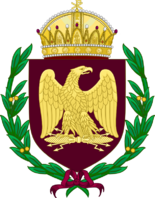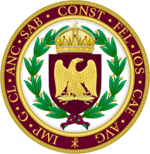Judiciary of Latium
The judiciary of Latium consists of three levels of courts and tribunals, composed by judges, who are considered civil servants that exercise judicial power on behalf the Emperor. Procedures for the appointment, promotion, and removal of judges vary depending on whether it is for the judicial, administrative, or appellate court. Judicial appointments are typically made by the Emperor. Judges at all levels are appointed by the emperor to serve a term of years and typically cannot be removed without specific disciplinary proceedings conducted before the Trigintiviral Court. Appellate courts and above, judges serve at the pleasure of the Emperor.
The Legal Bureau handles the administration of the judiciary, including paying salaries or constructing new courthouses. The Bureau also funds and administers the prison system. Lastly, it receives and processes applications for Imperial pardons and proposes legislation dealing with matters of civil or criminal justice.
| This article is part of a series on the |
| Politics of Latium |
|---|
 |
At the basic level, the courts can be seen as organized into:
- ordinary courts (ordinarius juris), which handle criminal and civil litigation
- administrative courts (juris amministrativius), which supervise the government and handle complaints
- extraordinary courts (extraordinarius juris), which handle matters relating to probate, patent or trademark, and the regulation of peerages, titles, and arms
The structure of the Latin judiciary is divided into three tiers:
- Inferior courts of original and general jurisdiction
- Intermediate appellate courts which hear cases on appeal from lower courts
- Courts of last resort which hear appeals from lower appellate courts on the interpretation of law.
Law
List of tribunals
Trigintiviral Court
The Trigintiviral Court (Latin: Collegium Trigintiviri) is the sole court of last resort in Latium. The Court developed to its current form over centuries, and ancient judicial boards of 30 men. As the courts became more sophisticated, the office of the Grand Quaestor, or Quaestor of the Palace (quaestor sacri palatii) became the senior legal authority in Latium, and eventually assumed the role of highest ranking jurist on the court.
The Trigintiviral holds discretionary appellate jurisdiction over all matters originating out of lower courts, whether ordinary or administrative courts, and original jurisdiction over all extraordinary matters, including probate, patent or trademark, regulation of nobility, titles and arms or seals, and high crimes. Cases are heard by a panel of 10 judges.
There is no fixed number on membership within the Trigintiviral, and often times jurists are appointed from lower courts to serve as a judge for a specific division. Individuals are appointed to the Trigintiviral by the Emperor, and serve at his pleasure. Currently there are 59 members of the Trigintiviral across three divisions: ordinary (criminal, civil or public), extraordinary (probate, patent or trademark, and regulation of nobility, titles and arms, and high crimes), and administrative. Though a section of the extraordinary division, high crimes are heard before an ad hoc bench, referred to as the Decemviral Court , which hears crimes of treason, terrorism, espionage, sedition, and piracy are brought. At times, the Emperor may sit on the bench for crimes before ad hoc Decemviral Court.
Ordinary
Court of Assidere
Courts of Assidere (Latin: Curia Assidere) sit in each judicial district of Latium with original jurisdiction and general jurisdiction over serious felonies, such as: murder, mass murder, aggravated cases of rape and criminal sexual abuse, aircraft hijacking, and drug trafficking and drug dealing. It is traditionally composed of a panel of three judges, and in the instance a jury trial is provided, 9 jurors. It also serves as a court of appeal for matters arising out of inferior courts.
Courts of Assidere are the first courts of review in civil and criminal actions. These courts have a limited scope of review, and are often restricted to hearing matters first brought up before the Inferior Court, rather than hearing direct evidence and determining the case on the facts. Because of this, an appellate court will not consider an argument that is raised for the first time on appeal (unless there was a change in law). Appellate judges are referred to as Magistrate of Appeal, and are appointed by the Emperor to serve at his pleasure. While parties may have the ability to appeal once as a matter of law, not all appeals reach the Assidere appellate jurisdiction if initiated at a province-level court.
Inferior courts
Inferior courts are divided into four forms: Civil Tribunals and Provincial civil courts; Diocese Criminal Tribunals and Provincial criminal courts.
- Civil Tribunals are courts of original jurisdiction for civil matters; require representation by barristers; are presided over by anywhere from one to three judges depending on importance of the case. Civil tribunals serve as first level appellate court for local courts.
- Provincial civil courts are courts of original jurisdiction for less significant civil matters, usually that do not exceed $20,500.
- Criminal Tribunals are courts that hear more serious criminal cases (usually felonies), and also serve as the first level of appellate court for Provincial criminal court.
- Provincial criminal court serves as a criminal court for minor crimes, typically below the level of a felony.
Administrative
Matters relating to administrative issues are first heard before a panel of at least three administrative law judge in an administrative hearing at the cabinet-agency level. All matters of administrative law must originate from these courts, and can be appealed. The Trigintiviral serves as the court of last resort for all administrative hearings, and as a matter of policy affords a high level of deference to lower court rulings unless a determination of arbitrariness can be found.
Extraordinary
The Trigintiviral may delegate matters of original jurisdiction to newly created courts, and since 1950 has done so with matters of probate, and patent or trademark. In practice, however, it rarely hears cases on appeal and delineates much appellate authority to the relevant appellate courts. It also acts as the court of original jurisdiction for all matters related to the regulation of peerages, titles, and arms, which is its primary purpose in the modern Latin judiciary.
Probate courts
Probate courts are located in each county of Latium – except for Castellum, which features multiple. There exists one national probate appellate court. These courts were created by Imperial decree and operate under rules governed by the Imperial Judicial Board.
Patent and trademark courts
Patent and trademark courts are located in each province of Latium – except for Castellum, which features multiple. There exists one national patent and trademark appellate court. These courts were created by Imperial decree and operate under rules governed by the Imperial Judicial Board.
High crimes
The High Crimes division of the Trigintiviral is the least active court in Latium, and meets ad hoc. There are no permanent members of the division. This division of the Trigintiviral hears all matters relating to espionage, treason, terrorism, sedition, and piracy.
